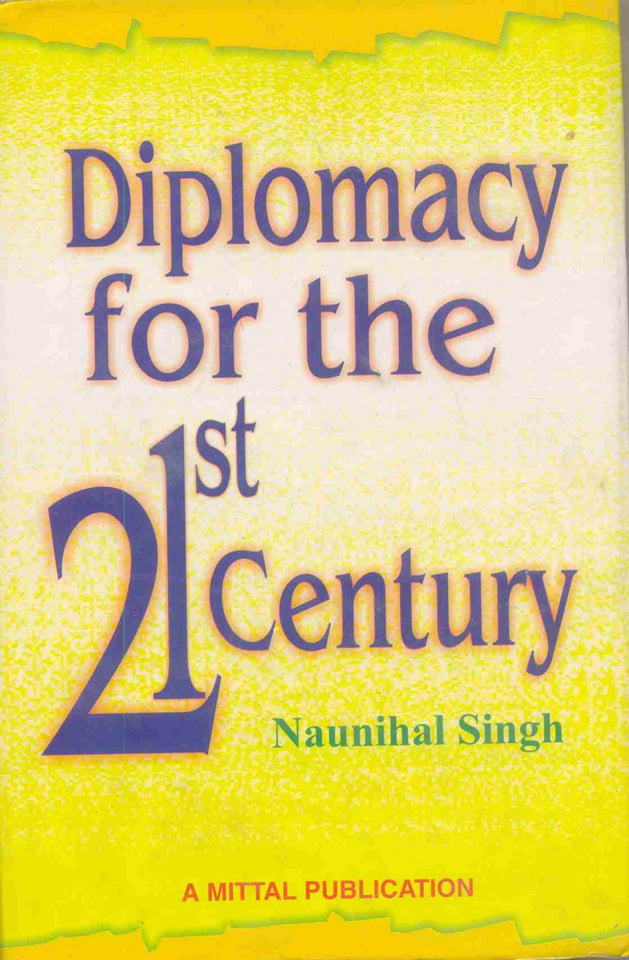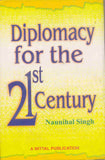Diplomacy for The 21 Century
Regular price
Rs. 395.00
We have considered the underlying forces that shape relations among nations in the present period of world history. We turn now to consideration of the process through which the official portion of these relations is carried on, diplomacy, and to consideration of the men who represent their nations in these relations, the diplomats. It is customary to consider these men and their activities as very important, but if the analysis of the various chapters is correct, the scene is set and the script largely written before the diplomats appear upon the stage. Can one really believe that it was Matternich, as ambassador to Paris, who was responsible for keeping France and Austria at peace? Can one believe that by taking a different stand, American diplomats could have prevented China from falling of the Communists? Is it possible that a knowledgeable and clever diplomat in New Delhi today could alter the policy of India toward the United States or the policy of the United States toward India? If so, one can believe that the proper diplomat in the proper place at the proper time saying the proper things can play a major role in international politics, that a good diplomat sets the stage and writes the lines as well as performing before an admiring public. Diplomacy can only gain public esteem by shaking off the intrinsically isolable arguments about virtue and conscience and concentrating on more practical goals. Reciprocal self-interest is and should remain the central theme. In this wise and eloquent book, the author presents his views on the challenges of diplomacy in the post-Cold War era. The author draws on his years of experience and knowledge to offer an overview of diplomacy as practiced in today’s world. Interweaving historical data the author reviews the Cold War period and its end in 1989, praising the diplomatic restraint in the years that have followed; discusses the ethical confrontation between power and conscience in a wide range of international decisions and actions; points out the difficulty of reconciling the promotion of universal human rights with respect for national sovereignty. The author goes on to deplore the lack of privacy in international negotiations that is the result of an increasingly intrusive media, shows that nuclear warfare is not a restraint against frequent military intervention, and warns against inflated views of what can be expected from the United Nations. He concludes with thoughts about the quest for peace in the middle East and Indo-Pakistan relations. Instructive, erudite, and witty, the authors tour through diplomatic history vividly demonstrates that the wisdom of the past can be immensely valuable as we seek to negotiate and maintain peace in the future. The author’ “Diplomacy for the Twenty-First Century” is part statecraft, part diplomatic history and entirely absorbing. His insights are as lucid as they are elegant, reaffirming his place as one of the most knowledgeable, experienced, wise and eloquent of modern political writers in the field so his reflections on diplomatic challenges in the 21st century are uncommonly perspective, rewarding and readable.
Dr. Naunihal Singh earned the degrees of M.A. (Economics), M.A. (Sociology). LL.B. (with International Law), Ph.D. (Management) and D.Litt. (International Business). He also obtained Diploma in Industrial Management from the Royal College of Science and Technology, Glasgow, U.K; and another Diploma in International Trade from La Sorbonne University, Paris (France). Dr. Singh taught as Professor of Business Administration at several institutions of USA. As a prolific writer, Dr. Singh has authoredabout fifty books on National and International Affairs. Formerly Director is the Government of India and Member, Board of Governors, Engineering College, Kurukshetra University, India, Dr. Singh has represented India at the United Nations Economic Commission for Asia and Far East (ECAFE) at Addis Ababa. He negotiated trade with Japan on behalf of the Government of India during Expo ’70 held in Osaka. Dr. Singh travelled widely in Europe including England, Canada, Mexico Brazil, Venezuela, Cambodia, Chile, Japan and other South-East Asian and African countries. A wide spectrum person, Dr. Singh was till recently a Member of Parliament (Rajya Sabha).
Guaranteed Safe Checkout





